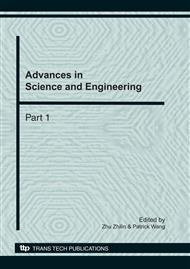p.96
p.103
p.111
p.117
p.121
p.127
p.133
p.140
p.149
Multi-Source Information Fusion Based on Data Driven
Abstract:
Take data driven method as theoretical basis, study multi-source information fusion technology. Using online and off-line data of the fusion system, does not rely on system's mathematical model, has avoided question about system modeling by mechanism. Uses principal component analysis method, rough set theory, Support Vector Machine(SVM) and so on, three method fusions and supplementary, through information processing and feature extraction to system's data-in, catches the most important information to lower dimensional space, realizes knowledge reduction. From data level, characteristic level, decision-making three levels realize information fusion. The example indicated that reduced computational complexity, reduced information loss in the fusion process, and enhanced the fusion accuracy.
Info:
Periodical:
Pages:
121-126
DOI:
Citation:
Online since:
November 2010
Price:
Сopyright:
© 2011 Trans Tech Publications Ltd. All Rights Reserved
Share:
Citation:


